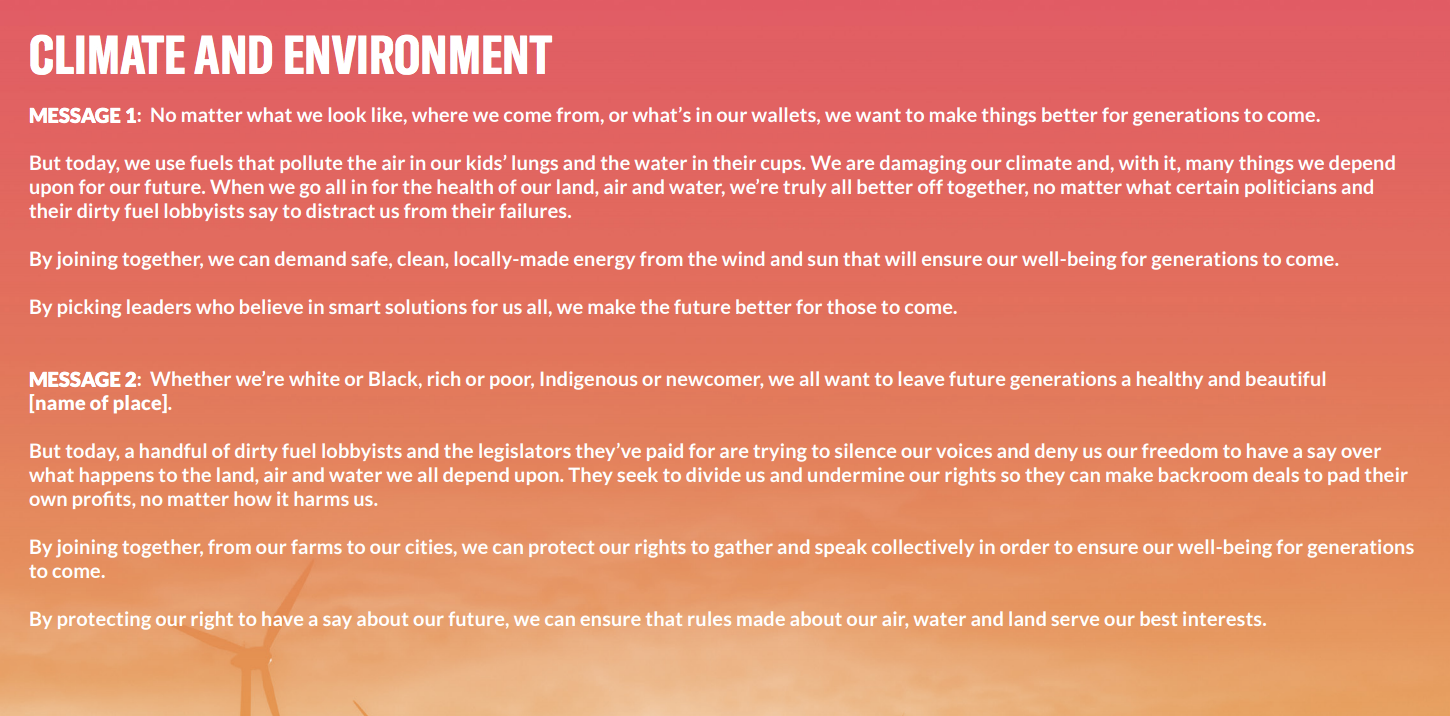Resources
Search below for resources covering the intersection of climate engagement, social science and data analytics.
RESULTS
We Make The Future Messaging Guide
The We Make the Future Messaging Guide is for campaigners, researchers, and all people who want to persuade others to take action to confront the challenges of a changing climate. The guide is based on rigorous research into perception and persuasion, and provide specific recommendations to engage base constituencies and persuade the middle (or people who haven't spent a lot of time thinking about specific solutions). The core of this work is the Race Class Narrative, an approach that weaves together economic empowerment, racial justice, climate justice, and gender equity, using language proven to work to mobilize and persuade people to take action.
This is a how-to guide. It provides guidance on:
- What to say and, crucially, what not to say
- How to weave together the rights words and the right narrative
- How to link related issues such as racial justice and climate justice within all your communications and calls-to-action
- Specific ways to use these messages on email, social media, and via text message
Politics & Global Warming, April 2020
For Republicans, belief in global warming per se is less of a sticking point (most think it's happening, including 47% of conservative Republicans), whereas accepting that it's human caused remains less common (only 30% of conservative Republicans). This report provides an analysis of public opinion data about the views of Democratic, Independent, and Republican voters registered on global warming, climate and energy policies, and personal collective action. Results show that the majority of registered voters believe that global warming is real (75%) and caused by human action (61%).
Can We Sustain It?
What can we learn from companies about how they win the "battle for our attention" to transform civic engagement from a hobby to a habit? Smart communications can help channel interest or outrage into civic action, that becomes a way of life for new and more experienced activists. A few recommendations: Make it timely, personal, and high-stakes. Inoculate against misinformation and spend time finding common ground. Expand perspectives through experiences.
Attitudes and Opinions About Environmental Issues in Arizona
2016 Survey of American Meteorological Society Members About Climate Change
According to a new survey of American Meteorological Society (AMS) members, 95% of meteorologists conclude climate change is happening, and more than 80% say it is human-caused. The survey represents a shift in the stance on climate change views among meteorologists.
Gallup's annual environmental poll found that more Americans (64%) are worried about global warming than at any point in the last eight years, and that 41% believe that global warming will pose a serious threat to them or their way of life in their lifetime--the highest percentage expressing that belief since the question was first asked in 1997. Additionally, there was a 10% jump from last year in the portion of Americans (65%) who believe that human activities are more to blame for rising temperatures, which was also the highest percentage recorded for that question since 1997.
2015: The Year the Environmental Movement Knocked Out Keystone XL
Acceptance of Global Warming Reaches Highest Level Since 2008 Among Americans
7 out of 10 Americans indicate that they believe there is "solid evidence of global warming over the past four decades," according to the results of the Fall 2015 National Surveys on Energy and the Environment (NSEE) -- the highest level of belief since Fall of 2008. Only 16% of Americans current believe there is "not solid evidence of global warming," which is the lowest level ever recorded by NSEE.
And The People Shall Lead: Centralizing Frontline Community Leadership in the Movement Towards a Sustainable Planet
Summarizes lessons learned and challenges to collaboration between traditional large environmental organizations and frontline or people of color led organizations. Draws on the conversation at the “Engaging Non-Traditional Groups in Coal Plant Retirement” session at the National Coal Plant Retirement Conference in Denver and co-facilitated by the Little Village Environmental Organization, American Lung Association, Sierra Club, and the National Association for the Advancement of Colored People (NAACP).
Toward an integrative social identity model of collective action: A quantitative research synthesis of three socio-psychological perspectives
Emphasize shared identity, injustice, and empowerment to motivate supporters to action. This paper analyzed data from 182 prior studies on a range of social movements around the world and integrated past theories of social movement participation into a unified framework, the Social Identity Model of Collective Action (SIMCA). People were more likely to be interested in and take action on a cause as a result of three elements: their social group was experiencing injustice towards it, they more strongly identified with that group, and/or they felt that acting together could have an impact (that is, a sense of collective efficacy). The influence of injustice was stronger when it was emotionally felt, not merely intellectually understood; and identity was more potent when it was politicized—that is, linked to an organization, movement, or broader social analysis. Of the three elements, identity was the most reliable and appeared to also influence the other two, so may be the most important for organizers to focus on.
Pagination
- Previous page
- Page 3


